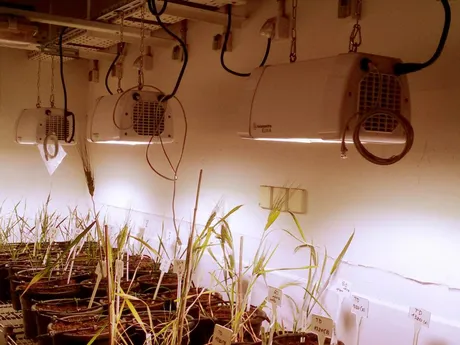Located at the University of Tel Aviv in Israel, the Institute for Cereal Crops Improvement (ICCI) is one of the world’s premier research organizations focused specifically on the collection, cataloguing, and improvement of cereal crops. Having previously struggled with the many problems of HPS lighting solutions for their indoor growth rooms, the team at the ICCI decided to swap to LEDs and chose Heliospectra's Elixia platform for the many advantages it offered, especially its adjustable spectrum options. Thanks to the lamps, they’re now enjoying improved control, better heat management, and major energy savings - crucial factors for any grower, research or commercial.
“That’s (HPS) what we used previously. They generated too much heat and were expensive to run, so we were able to get a special budget to replace them with more energy efficient units like Heliospectra's. […] We did the calculations and were able to show the university that they’re going to save around 3000 Euros per room, per year, in electricity cost.”

In order to facilitate the research they’re conducting, the institute is utilizing speed breeding methods. By growing indoors, and with the fully controllable Elixia lights, the ICCI research team will be able to speed breed crops consistently and uniformly, while still maintaining a low heat profile. Professor Amir Sharon, head of the ICCI expects that they will now be able to yield four generations of wheat per year, as opposed to the two generations they were getting under their previous HPS (high-pressure sodium) systems. This extra yield allows their team to conduct more tests per year, resulting in a much speedier and flexible research process.
These extra generations of wheat every year are especially important to the team at the ICCI due to the nature of their research. The majority of the work being done by them is centered on cross-breeding commonly cultivated species of wheat (such as bread wheat) with wild plants which contain different disease resistances and qualities. The ICCI has a collection of over 15,000 different sessions (samples) of different wild plants in their possession, giving them the ability to breed just about any combination they can conceive.

“In addition, wheat demands, strong light. Usually we grow it outside in greenhouses with natural sunlight, and just supplement with some additional light. However, we wanted to move to indoor production, and then the lights we used (HPS) became problematic. Either they generated too much heat, or they weren’t strong enough to get good growth of the plants. That’s why we’ve moved to the new system.”
Through these crosses they hope to find ways in which to breed wheat varieties which are resistant to rust pathogens – a group of diseases which can devastate cereal crops. They also hope to find ways in which they can improve factors such as yields, grain quality, and size in commonly cultivated wheat variants. By doing so, cereal crops can be grown in far more efficient ways with reduced pesticides input, helping commercial growers meet the ever-increasing demand for their crops, and helping smaller sustenance farmers provide more for their communities.
Looking to the future, the work the ICCI is doing is exciting and has the potential to have a tangible positive impact on millions of people all around the globe. Sadly, the results of their research can take anywhere up to 15 years to be consistently visible, so while nothing can be discussed right now, it’s definitely something to look forward to in the long term.

 Heliospectra
Heliospectra